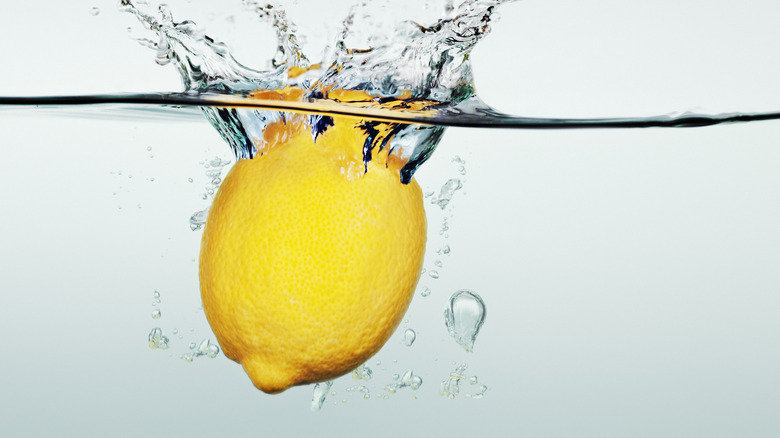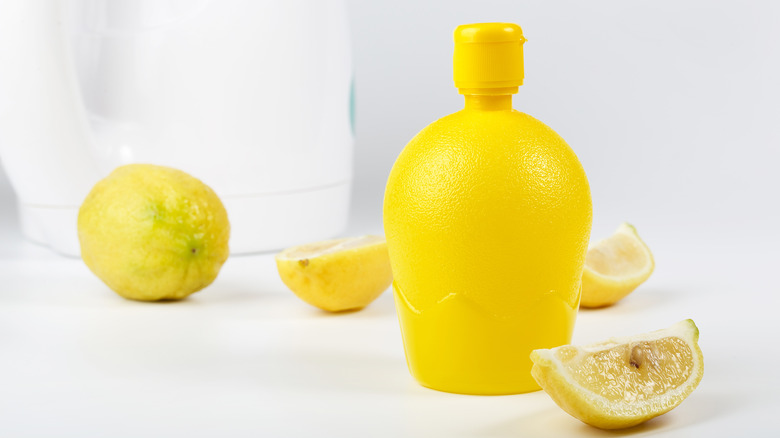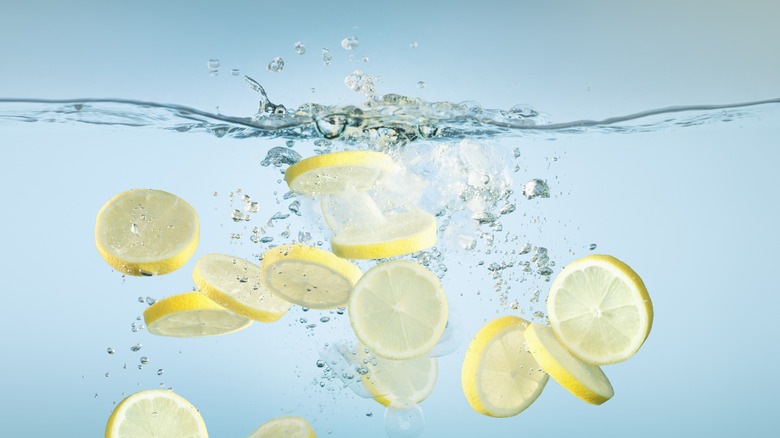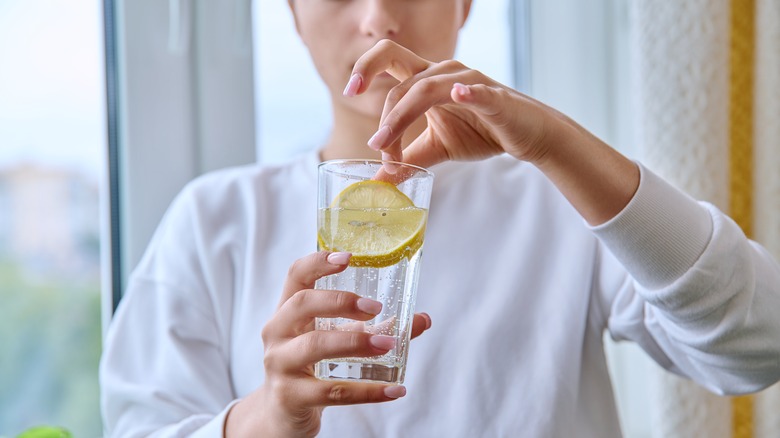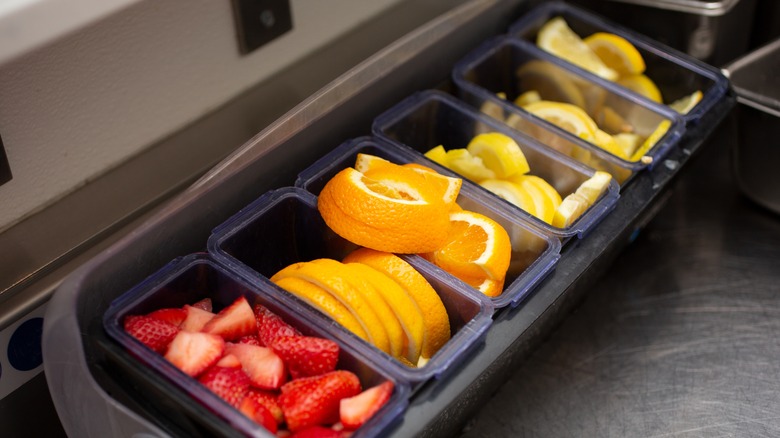False Facts About Lemon Water You Thought Were True
Many a wellness influencer has touted the benefits of lemon water, often citing vague or patently untrue health benefits. Celebs from Jennifer Aniston to Gisele Bündchen proclaim that warm lemon water does everything from keeping their digestion moving to neutralizing free radicals in the skin. Even Gwyneth Paltrow claims it's the ideal way to "flush out" ... whatever that means.
But while lemon water may be a tasty way to start the day — and slightly easier on the digestion than drinking a cup of black coffee first thing — it's far from the magical youth elixir these A-listers would have you believe. From claims it can burn belly fat to assertions it alkalizes the blood and proclamations it's somehow the ideal detoxifying potion, the simple combo of lemon and water has a lot to answer for. Ready to set the record straight? Here are the myths about lemon water that you should stop believing.
Myth: Lemon water is a nutrient-dense way to start the day
Lemons are a member of the citrus family, and as such are very rich in vitamin C. One lemon contains over 30 milligrams of vitamin C, about ⅓ of the recommended daily intake for men and 40% of the recommended daily intake for women. But aside from vitamin C, lemons don't have loads of other nutrients, aside from about 80 milligrams of potassium, which barely scratches the surface of the 2600-3200 milligrams recommended for adults daily.
By comparison, a cup of strawberries contains not just a whopping 97.6 milligrams of vitamin C but also 254 milligrams of potassium and 27 milligrams of calcium. Strawberries are also rich in fiber, with 3.3 grams per cup. Only five percent of Americans meet the recommended daily intake for this macronutrient, according to a 2017 report in the American Journal of Lifestyle Medicine, and since fiber intake contributes to improved gut health and balanced blood sugar, it's something we could all stand to get a bit more of. While a whole lemon does indeed contain about 2 grams of fiber, very little of that makes its way into the juice.
Myth: Bottled lemon juice is significantly worse for you than fresh
Juicing lemons is far from a difficult kitchen task, but it can certainly be an annoyance, with seeds slipping into the juice and the acidity in lemons aggravating invisible paper cuts. It's no wonder so many take advantage of bottled juice instead, albeit begrudgingly. After all, there's no way that bottled juice holds a candle to fresh juice when it comes to health benefits, right?
You'd be surprised. Bottled lemon juice is pretty much on par with fresh when it comes to nutritional content, albeit with a slightly lower richness in vitamin C (25 milligrams per 100 grams of juice as compared to 39 milligrams for the same amount of fresh). Fresh lemon juice outweighing packaged has more to do with the additives and preservatives in the latter, notably sodium metabisulfite or potassium metabisulfite. Both are categorized as allergens and can be deadly to some people. That said, for most people, they're perfectly safe to consume. So, as long as you're not sensitive to these additives, there's no reason to worry about swapping out fresh for store-bought lemon juice.
Myth: Lemon water directly contributes to weight loss
Many of the influencers who tout the benefits of lemon water discuss above all its purported weight loss properties, with some even claiming it has the power to burn belly fat. Of course, this is far from the reality ... but lemon water can indeed help you lose weight, albeit indirectly.
Drinking lemon water — or water in general — can promote feelings of fullness, which may keep you from overeating. One 2008 study in the Journal of the American Dietetic Association found that drinking half a liter of water before breakfast reduced the number of calories consumed by 13%. And the benefits of water on weight loss are not solely linked to reducing food intake. One 2008 study in Obesity found that improved hydration promoted weight loss for overweight women — and this is regardless of any changes to diet or exercise regimes.
That said, these benefits were linked to water alone; the addition of lemon has yet to be scientifically linked to improved weight loss. If adding lemon to your water makes it more palatable and thus makes you more likely to drink it, it could theoretically be said to aid in weight loss ... but that's about it.
Myth: Lemon water has an alkalizing effect on the body
Perhaps the most pervasive myth about lemon water is that it has an alkalizing effect on the body and the blood. As for why this is a good thing, we must look to the Alkaline Diet. Proponents of this regime claim that certain foods, such as meat and dairy, acidify the blood, while others, like fruits and vegetables, alkalize it. Consuming acidifying foods is believed to contribute to a greater susceptibility to illness, with some even claiming that acidic blood could make you more susceptible to cancer. Consuming alkalizing foods, including alkaline water, is believed to restore this essential balance.
Confusingly, lemon juice is touted as an alkalizing food, despite its acidic pH. This is due to the alkaline byproducts lemons produce once digested. (It doesn't make it any stranger that Gwyneth Paltrow adds lemon to her alkaline water, neutralizing the pH completely.) But while eating a lot of lemons will certainly make your urine more alkaline, a 2011 study in the Journal of Environmental and Public Health shows that what you eat has very little effect on the pH of your blood.
Myth: Lemon water can detox your body
Some healthy living divas claim that the body benefits greatly from a "detox" or a cleanse. Reducing food intake (or fasting completely), and drinking water with lemon or sometimes with cayenne pepper (such as in the Master Cleanse), has been attributed with rejuvenating your skin and even improving weight loss, eradicating toxins from your bloodstream. But much like alkalizing, detoxing just isn't something your body needs. The kidneys are already a built-in detoxifier; replacing food with lemon water won't necessarily make them do their job any better.
That said, hydration can indeed improve kidney function and help these organs clear sodium, urea, and other waste from the body more efficiently. This in turn can help reduce your risk of developing kidney disease later on. But once more, these benefits stem from the consumption of water — not lemon water. All the lemon does in this context is make your water tastier.
Myth: There are no downsides to drinking lemon water
While lemon water far from lives up to its lofty reputation, most of our myth-busting thus far hasn't actually indicated there's anything wrong with adding lemon to your water. If anything, if you like the taste of lemon in your water, it could make it easier to drink your recommended 11 to 15 cups per day. That said, some people should pause before adding a squeeze of citrus to their beverage.
Lemon juice's innate acidity can disrupt the pH of your mouth, potentially weakening tooth enamel or even eroding it over time. Once the tooth's enamel is worn away, the dentin beneath is exposed, which could lead to painful tooth sensitivity. Since dentin is yellower than enamel, this could make your teeth look stained, and since you can't grow enamel, there's no coming back from this erosion. Drinking too much lemon water could also aggravate heartburn and cause irritation to the esophagus, especially for those with preexisting digestive woes like GERD.
Myth: Lemon water is a good choice in a restaurant or bar
It's one thing if you're making lemon water at home, but if you're ordering lemon water in a restaurant or bar, that's a horse of a different color. One 2007 study in the Journal of Environmental Health found nearly 29% of lemons served in restaurants were contaminated with microbes ranging from fecal matter to E. Coli., and that held more than double if the rind is floating in your glass. Nearly 70% of restaurant lemon wedges have contaminated rinds, according to the research.
And that's not all. A 2019 study in Food Protection Trends found that salmonella, which the CDC estimates causes more than 1 million foodborne illnesses each year nationwide, survives quite well on unrefrigerated lemon slices, like the ones sitting in the garnish tray at your local bar. All the more reason to have your water plain, especially if you're dining out.
